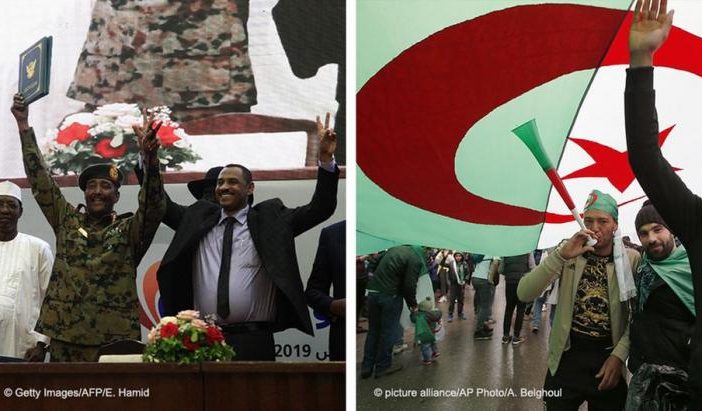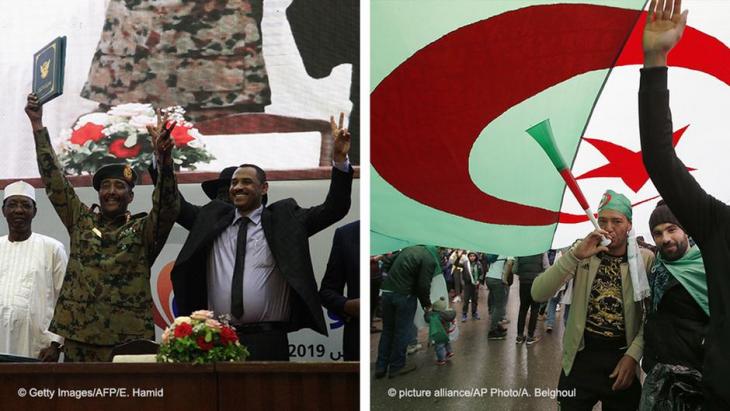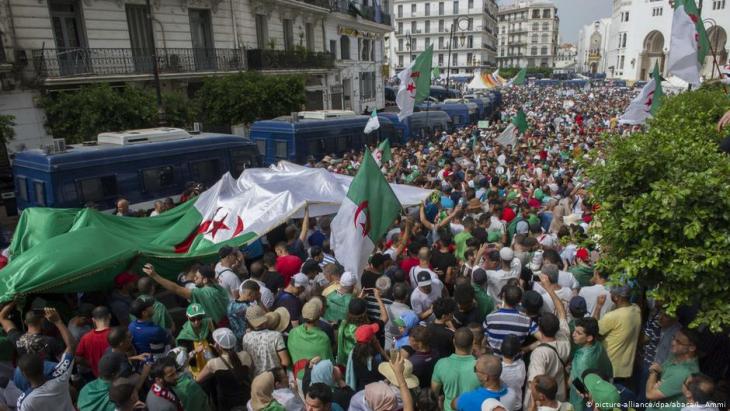en.qantara.de
By Khaled Salameh
A watershed moment in Sudan: after 30 years of repression, a civilian-led government looks set to co-determine the country’s future path. It’s quite a different picture in Algeria: here, the people have been demonstrating against the military for months, to no avail.
Sudan and Algeria: in both nations, the military maintained a tight grip on power for decades. In both nations, civil society suffered greatly under decades of state repression. In both nations, the people are calling for justice and democracy.
But whereas in Sudan protesters have been able to reach agreement with the army, the mass protests in Algeria continue unabated. Hundreds of thousands of people take over the streets every Friday to show that even after six months, they have not given up and will persist until their demands are met.
The South African Institute for Security Studies recently determined that demonstrators in Algeria “have achieved much more than observers had predicted.”
The rebellion’s key achievement was the resignation of President Abdelaziz Bouteflika after 20 years in office. Instead of standing for a fifth term as planned, he stepped down and renounced a renewed mandate. A whole host of politicians and businesspeople long suspected of corruption were arrested.
But since then, the protest movement has not clocked up any further success. Algerians are still no closer to a genuine political new beginning. The regime led by Algeria’s Chief of Staff Ahmed Gaid Salah appears deaf to the demonstrators’ demands. For example, the military man is calling for early presidential elections, while the protest movement wants to wait until Gaid Salah and interim President Abdelkader Bensalah have resigned. A request rejected by the regime.
You may also like: The real enemies of the Arab Spring
Army eschews far-reaching changes
The military wants to prevent constitutional debate and far-reaching structural reforms at all costs. Instead, it is pushing for new elections to be held as soon as possible. In a bid to break the political impasse, a “National Commission for Dialogue and Mediation” was set up in July. “We can’t waste any more time,” the 79-year-old Gaid Salah blustered and claimed, “all fundamental demands” by the protesters are now “entirely fulfilled”, and that only the last phase of the presidential election was still open. The protest movement should give up “irrational demands”, such as the resignation of all civil servants, he added.
One of the regular Friday demonstations in the Algerian capital Algiers (photo: picture-alliance/dpa)
Intransigent military blocking Algerian transition: Rachid Ouaissa, political scientist and Middle East expert, sees fundamental differences in the history and structure of the two nations’ armies: “firstly, the Algerian army was legitimised through a revolution. Secondly, it is highly present in society.” Enjoying the support of Saudi Arabia and the UAE, the Algerian military also maintains ties with the West, playing a strategically relevant role in the Mediterranean region and Africa
But the newly-formed dialogue commission is also rejecting this way forward and insists on the dissolution of the very same power circle that ruled the nation for decades alongside ex-president Bouteflika.
The situation has been exacerbated by the fact that thus far, the popular movement has not appointed its own leadership to specify demands and take part in negotiations. And so, six months after the start of peaceful mass protests in Algeria, the political situation has become untenable.









